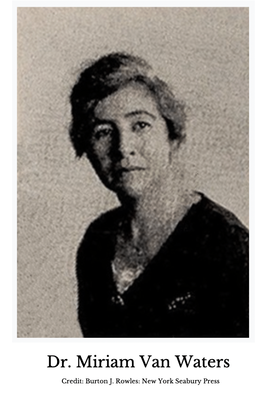
Dr. Miriam Van Waters
Sister, Surrogate Mother, and Adoptive Mother
American Prisoner Reformer, Notable Writer
October 4, 1887 – January 17, 1974
She was born on October 4, 1887, in Greensburg, Pennsylvania. As a child, she was surrounded by books, as her father was a passionate reader himself. Her interest for education and writing led her to attend the University of Oregon and Clark University, where she received her Master’s Degree in Psychology and a Doctorate in Anthropology. With these degrees, she grew an interest in prison reformation. She worked as the Superintendent of the Los Angelos County Juvenile Hall for Girls, the Superintendent for the Massachusetts Reformatory for Women, in Sherborn MA, and the Head of the Frazier Detention Home for boys and girls in Portland, Oregon. Further, she began the reformatory early education school, El Retiro, which opened in 1919. This school was somewhat successful and remained until 1961.
Dr. Van Waters was better known for the papers and interpretive reports that she wrote about her experiences in Prison Reformation and her personal beliefs about the system. During her time in reform, she wished to improve health-care for inmates, counseling, nutrition, fitness, and other social services that were being neglected. However, as a woman, she was often denied support and the compassion that she deserved.
Multiple Court cases were presented against her to attempt to dismiss her from her high positions. According to Estelle B, Freedman of the University of North Carolina Press, prosecutors often accused Van Waters of "damaging morals of young girls... and undermining traditional social order."
During Van Water’s time as Superintendent at the Framingham Facility, according to Freedman:
“Most of the inmates were serving time for…."crimes against chastity", alcoholism, and other offenses known at the time as "crimes against public order", which in some cases included being homeless or being a "stubborn child". She (Dr. Van Waters) emphasized rehabilitation rather than punishment, referred to the prison population as students rather than inmates or prisoners, relaxed the dress code, encouraged the women to talk to one another and to staff members, brought in guest speakers such as Frankfurter, Thompson, Dummer, and expanded the women's freedom of movement within the prison and outside its walls.”
Despite the charges presented, Van Waters kept her position as Superintendent until her retirement in 1957. During her lifetime, Van Waters wrote three books: Parents on Probation, Youth in Conflict, and Report on the Child Offender in the Federal System of Justice. Her writing focused on her beliefs for prison reform. These publications are available for purchase.
She passed on January 17, 1974 and was buried in the Pine Hill Cemetery, in Sherborn, MA. Her devotion and work has inspired much of the values of correctional reform and rehabilitation that exist in the present day.
Dr. Miriam Van Waters is one of the more well-known women in this collection as her work in Sherborn has been recorded by physicians in the nation of Turkey and is still referenced today.
Sister, Surrogate Mother, and Adoptive Mother
American Prisoner Reformer, Notable Writer
October 4, 1887 – January 17, 1974
She was born on October 4, 1887, in Greensburg, Pennsylvania. As a child, she was surrounded by books, as her father was a passionate reader himself. Her interest for education and writing led her to attend the University of Oregon and Clark University, where she received her Master’s Degree in Psychology and a Doctorate in Anthropology. With these degrees, she grew an interest in prison reformation. She worked as the Superintendent of the Los Angelos County Juvenile Hall for Girls, the Superintendent for the Massachusetts Reformatory for Women, in Sherborn MA, and the Head of the Frazier Detention Home for boys and girls in Portland, Oregon. Further, she began the reformatory early education school, El Retiro, which opened in 1919. This school was somewhat successful and remained until 1961.
Dr. Van Waters was better known for the papers and interpretive reports that she wrote about her experiences in Prison Reformation and her personal beliefs about the system. During her time in reform, she wished to improve health-care for inmates, counseling, nutrition, fitness, and other social services that were being neglected. However, as a woman, she was often denied support and the compassion that she deserved.
Multiple Court cases were presented against her to attempt to dismiss her from her high positions. According to Estelle B, Freedman of the University of North Carolina Press, prosecutors often accused Van Waters of "damaging morals of young girls... and undermining traditional social order."
During Van Water’s time as Superintendent at the Framingham Facility, according to Freedman:
“Most of the inmates were serving time for…."crimes against chastity", alcoholism, and other offenses known at the time as "crimes against public order", which in some cases included being homeless or being a "stubborn child". She (Dr. Van Waters) emphasized rehabilitation rather than punishment, referred to the prison population as students rather than inmates or prisoners, relaxed the dress code, encouraged the women to talk to one another and to staff members, brought in guest speakers such as Frankfurter, Thompson, Dummer, and expanded the women's freedom of movement within the prison and outside its walls.”
Despite the charges presented, Van Waters kept her position as Superintendent until her retirement in 1957. During her lifetime, Van Waters wrote three books: Parents on Probation, Youth in Conflict, and Report on the Child Offender in the Federal System of Justice. Her writing focused on her beliefs for prison reform. These publications are available for purchase.
She passed on January 17, 1974 and was buried in the Pine Hill Cemetery, in Sherborn, MA. Her devotion and work has inspired much of the values of correctional reform and rehabilitation that exist in the present day.
Dr. Miriam Van Waters is one of the more well-known women in this collection as her work in Sherborn has been recorded by physicians in the nation of Turkey and is still referenced today.
